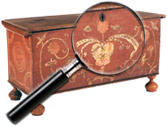The Prudent Mallard Legend
Prudent Mallard (1809 to 1879) was a renowned New Orleans nineteenth century merchant and probable cabinetmaker. Many collectors and experts consider Mallard to be the leading, even iconic, figure in nineteenth century furniture in the lower South. Tom Halverson, Director of American Furniture and Decorative Arts for the New Orleans Auction Galleries believes that Mallard’s fame was well deserved. “I believe that by the middle of the nineteenth century the name “Mallard” was almost a generic term used in Louisiana to describe a class or style of furniture.” He says, “Just as ‘Kleenex’ identifies facial tissue today,’”Mallard’ meant Rococo Revival style furniture then.”
A Soaring Legend
Louisiana has long had an atmosphere where myths and legends germinate into a blend of truth and fable. In this fertile climate Prudent Mallard’s reputation has soared. The hazy Mallard story begins at his birth in 1809 in Sevres, France to Sir Nicolas Mallard of Edinburgh and Michael Louise Oger of Paris. Emigrating to New York around 1829, it is rumored that he worked with the acclaimed cabinetmaker Duncan Phyfe for a time. Finally in 1830 Mallard arrived in New Orleans just when the plantation economy was in its ascendancy.
By 1838 Prudent had established his “Magasin de Meubles” with a partner, and had married a local bride, Augustine Beltran. He prospered and expanded his business despite competition from at least 100 other cabinetmakers and furniture dealers. Besides the Rococo Revival furniture for which he is known, the Mallard enterprise offered an array of fancy goods including china, cut glass, mirrors and papier mache articles. Although his furniture is often labeled “Manufactured by P. Mallard”, there is little evidence that Mallard actually made the massive high post beds, the armoires and the delicate marble-top dressing tables called “duchesses”. The most conclusive research done by Stephen Harrison, once a curator at the Louisiana State Museum, and now the Curator of Decorative Arts at Atlanta’s High Museum, has found no evidence that Prudent Mallard possessed the equipment for large-scale production. The massive lathes and other tools required for turning the tall bed posts were not mentioned in the inventories of Mallard’s 1855 bankruptcy or the 1874 liquidation of his business. Harrison’s research found that that the New Orleans furniture business in Mallard’s time depended mainly on goods imported from Europe and the American Northeast. Tom Halverson agrees with Harrison’s assessment, adding that Mallard likely sold furniture made by some of the major Eastern manufacturers, in particular, Alexander Roux of New York.
Reference note by p4A furniture editor Robert H. Goldberg, appraiser of antiques and residential contents in New Orleans and Senior Accredited Member of the American Society of Appraisers.
